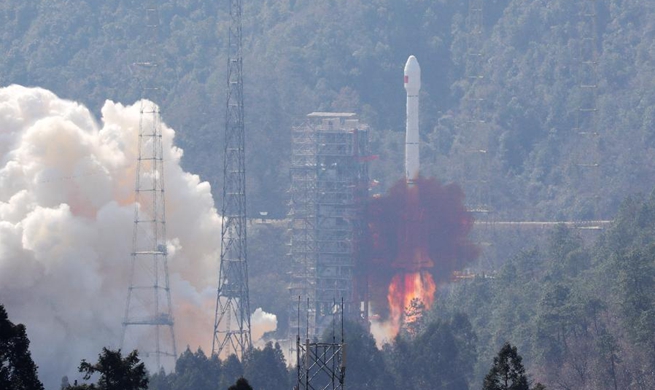WASHINGTON, Feb. 12 (Xinhua) -- American space agency NASA said in its 2019 Fiscal Year Budget Estimates released on Monday that the direct federal government support of the International Space Station (ISS) will be ended in 2025 with a transition to commercialization of low Earth orbit.
NASA said it is "redirecting funding to innovative new programs and providing additional funding to support new public-private initiatives," a move that will turn the joint space project, which is participated by multiple space agencies in America, Russia, Japan, EU and Canada, to the private sector.
"[NASA] begins relying on commercial partners for our low-Earth orbit research and technology demonstration requirements," NASA's acting administrator Robert Lightfoot said after the budget release.
In its budget request submitted to Congress, NASA said that it will begin a new 150 million dollars program for new commercial Low Earth orbital platforms and capabilities for use by the private sector and NASA.
NASA proposes to allocate nearly 53 percent of its 19.9 billion U.S. dollars budget to an "innovative, sustainable" campaign that can return humans to the Moon, which is followed by human missions to Mars and other destinations.
This year's total budget is 800 million dollars larger than that in 2018, but the moeny for the ISS is slightly smaller than last year. It is estimated to remain almost the same in transition years between 2020 and 2023 while in last year's budget estimates, money given to the ISS would have kept expanding in the coming four years.
"This proposal provides a renewed focus to our human spaceflight activities and expands our commercial and international partnerships," Lightfoot said.
The request also showed that a total of 889 million dollars will be invested in advanced exploration systems. The budget for such a kind registered zero in 2018's budget.
NASA must "manage the aging International Space Station to maximize its use as a test-bed for research and development of new technologies," "all within the constraints of a static budget profile," according to NASA's 2019 Fiscal Year Volume of Integrated Performance, a report also released Monday.
The ownership and use of the ISS is established by intergovernmental treaties and agreements. It is divided into two sections, the Russian Orbital Segment and the United States Orbital Segment, which is shared by many nations.
Although NASA vows to end direct federal spending on the ISS, it puts returning the station's crew transportation to the United States as the agency's priority goal, in a bid to end "our dependence on Russian spaceflight capabilities."
Russia's Soyuz spacecraft is now used for transport to and from the ISS.

















